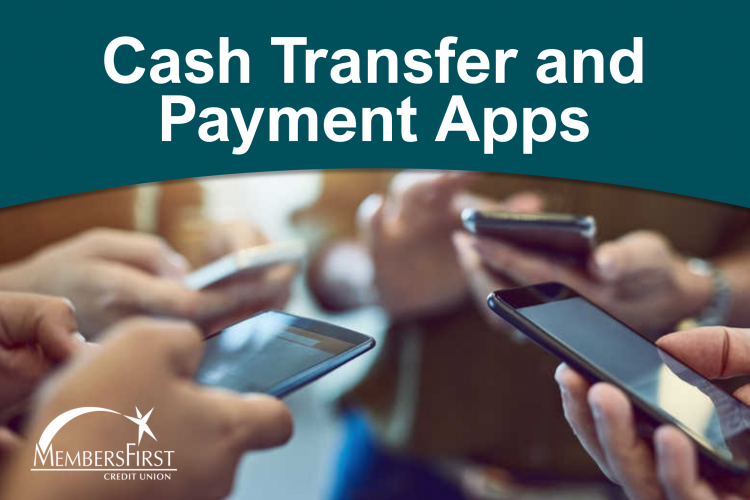How cash transfer and payment systems work, what to avoid and how to use them.
Article Highlights:
- Cash transfer and payment apps can be convenient, but are not without flaws and security risks.
- Troubleshooting and support should only be initiated within the app.
- Advice on how to avoid being scammed while using payment apps or if you need post-transaction assistance.
- Transfer errors that result in a loss of funds are not the responsibility of the linked financial institution to recover.
Cash transfer and payment apps, also referred to as peer-to-peer (P2P) payment systems, like PayPal’s Venmo, Square’s Cash App and Zelle®, are forever changing the way we handle our money and our social finances. Dining out and splitting the tab is now easy and convenient. Paying back borrowed money can be done anywhere, at any time.
But, are these apps really living up to the hype? Are they secure? And if a mistake is made when transferring funds, who’s responsible and who do I call for help?
To answer these questions, let’s first explore how they work.
HOW DO CASH TRANSFER APPS WORK?
Say you are out to dinner with friends and your pal, Meghan, offers to cover the tab and have everyone pay her back. She hands her card to the server while you and your friends pull out your phones. You open the cash-transfer app or website of your choice, find Meghan in your contact list and key in the amount to send. You are likely required to input your PIN or prove your identity in another way before the transaction is finalized. Within seconds, Meghan receives a notification that the money has been sent, and the transfer from the account tied to the payment app of your choosing begins. Once the funds actually transfer, Meghan can leave them in the app or move the money to an account at the financial institution of her choice.
WILL IT COST ME TO TRANSFER MONEY?
Most cash transfer apps allow you to make a payment from a linked financial account or directly into the app account at no cost. However, several providers will take two to three percent of any payment made with a debit or credit card. Also, if you want your transfer to happen immediately, you may have to pay a fee.
HOW LONG WILL IT TAKE FOR THE MONEY TRANSFER TO CLEAR?
Though your friend may receive a notification the transfer has been made, the money transfer usually takes one to three business days to clear.
ARE CASH TRANSFER APPS SAFE?
All money transfer and payment apps are careful to encrypt your financial information and to use security measures for protecting your funds. However, these measures aren’t foolproof. Many apps have been targeted by hackers and scammers.
It’s very important to remember most payment apps prefer to troubleshoot or offer support directly through the app or email rather than offering telephone or web support.
DO THESE APPS OFFER SUPPORT IF I NEED HELP?
It’s very important to remember most payment apps prefer to troubleshoot or offer support directly through the app or email rather than offering telephone or web support.
Use caution when searching online for a support number, website or email address. Many phishing websites have been created to trick visitors into thinking they have found an official support website for their app. Fake numbers have been created as well. A quick web search will return various numbers, websites and emails claiming to offer support for payment apps, but not all are correct.
If you’re wondering whether the number, site or email address you have is correct, a good indicator is legitimate cash-transfer services will not ask you for personal information like usernames, passwords or banking information. If someone asks for this information, you should not comply.
Some scam artists have taken support a step further by asking the unsuspecting user to download a second app in order to help them. After the app has been downloaded and a little information is shared, swindlers can then access much more than your payment apps—like, photos, documents, your device’s camera, email, text messages and all other apps on your device.
IF SOMETHING GOES WRONG WITH A TRANSFER, WHO IS RESPONSIBLE FOR COVERING THE LOSS?
Unfortunately, if you’ve been scammed or have another issue with a cash or payment app, it’s up to you to recover the funds, goods or services. Most apps will offer their assistance to law enforcement agencies and notify users if they’ve been scammed, but that’s usually the extent of their fraud protection.
If you choose to use your money transfer app for a business-related transfer, fraud protection is limited even further. Most services clearly state in their policies that their platforms should not be used in business transactions. Many consumers, though, choose to ignore these warnings and use Venmo and Cash App to pay for goods they’ve bought on Craigslist, to sell a used item or even to accept funds for a service they’ve provided.
If you disregard these rules, the service will likely offer no fraud protection or assistance in reclaiming lost funds. Many of them will not even honor a business transaction at all. It’s best to only use the service among friends and people you know and trust.
Many users mistakenly think their financial institution will be able to reconcile and recover lost funds if a payment goes awry.
Many users mistakenly think their financial institution will be able to reconcile and recover lost funds if a payment goes awry. However, financial institutions like MembersFirst are never responsible for a payment or transfer. While we never want to see you lose money for a simple mistake or because you have been victimized by a scam, there isn’t much we can do about it once the transaction has been initiated. For this very reason, we strongly advocate practicing caution when transferring money online or by app and following the suggestions below.
Protect yourself from being scammed by taking the following steps:
- Use two-factor identification and a PIN before completing a transaction.
- Ask to be notified about every transaction.
- Never use these apps for business purposes or for a money transfer with someone you don’t personally know.
- Triple-check your recipient’s information before you send a payment; transposed letters or numbers in an email address or phone number could send your money to the wrong person.
- Only install a payment app on a device with a password, passcode or PIN.
- Set up all security features of the app(s).
- Search for help and support through the app before resorting to an online search.
- Never give anyone claiming to be a legal support representative access to your cash transfer app or your phone and never download troubleshooting apps from a supposedly legal source at their request.
When used responsibly between peers, cash transfer and payment apps can be a very convenient way for friends to share expenses or pay back borrowed funds, but exercise caution before hitting “send.”


